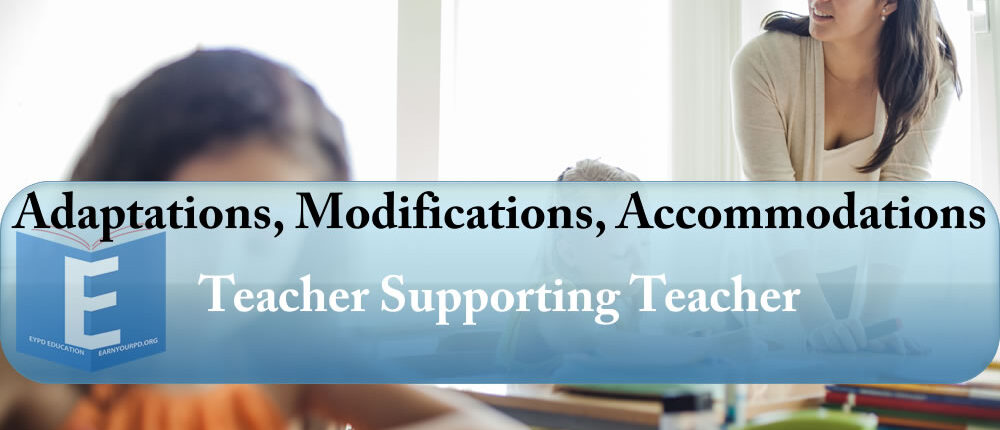This course consist of 30 hours of online assignments and activities. Educators will receive 3.0 CEUs after the completion of this course. CEUs are issued by The North Mississippi Education Consortium. We can deliver this course online or onsite**. The cost for the online delivery is $65.
Workshop Description:
How well does the special education and subject area teacher work together? Is it painful with contention or well planned with equal input. Is the focus really on the students? Making sure all students get the opportunity to access the very best of a school system is imperative to the success of the relationship of both parties. Most students with learning disabilities share the same learning environment with all students. It takes collaboration with special education and subject area teachers to plan out an effective strategy for students. A part of the planning includes the general education teachers understanding of Adaptations, Accommodations and Modifications. Bringing clarity to these areas puts instruction and the curriculum into perspective for general education teachers.
This workshop requires educators to implement new or improve current strategies in their education setting. All teachers will participant in peer classroom observations for learning and improving current practices. A district, school and teachers have to find the right balance for their environment. You will need a mentor or administrator to complete some parts of this workshop.
This workshop includes activities for creating your own S.M.A.R.T. goals. Teachers are strongly encouraged to participate in this activity as part of workshop. Discussions and chats are available for all educators to further engage in this activity. We also provide a PLC tool for teachers to use in their school. The PLC and the S.M.A.R.T goal tool is available for use after the completion of this workshop.
Each workshop has teacher workload information and activity. This discusses the need for balance of teacher workload. It is meant for teacher encouragement and accountability. The workloads of teachers is something that can be addressed through consistent team collaboration. Team collaboration is strongly encouraged in all workshops.
The coursework involves reading assignments that aides in thoroughly understanding the learning objective. Teachers are required to submit a lesson snippet of the learning objective. This is for the implementing the learning objective in real time. The workshop provides a peer observation activity to further ensure the learning objective is being used. It is the intent that all the activities, discussion and assessments help the educator achieve the needed outcome(s).
This workshop will focus on the following areas:
UNIT/WEEK 1
Learning Objective:
What do you know about Curricula Adaptations? Adapting to an environment is a normal part of life in general. How do you adapt to a new job or a new person in your life? Adapting does not look the same for each person. No cookie cutter pattern works the same for everyone. A good foundation is required but where it leads is different for each individual. (1) As a general or special education teacher, please give your opinion on Adaptations from the readings. (2) As a general education teacher, what kind of input did you have a student IEP or 504 plan? (3) As a special education teachers, what input do you require of general education teachers? (4) Is Co-Teaching implemented in your school.
UNIT/WEEK2
Learning Objective:
How do you make Accommodations work? Let us get personal! How would you want your child accommodations structured? As a teacher, reflect on this (like a parent) as you work with other general or special education educators. Put yourself in a parent role. Looking outside of yourself will provide a wealth of appreciation and understanding to your role. Reflect back on your experiences and actually use them. (1) As a general education teacher, how to you plan for accommodations? (2) As a special education teacher, how do you help general education teachers with planning? (3) Would your school benefit from a Co-Teaching environment?
UNIT/WEEK3
Learning Objective:
Modifications changes things. What is the goal in academic modifications for students? How much modification is enough or not? The expectations set by state or local education boards determine mastery requirements. What autonomy do you have in your local school? How do educators come to the absolute classroom decisions? Do your local school district or system provide you with enough guidance? Is there a wide gap of understanding between special or general education teachers? (1) As a general education teacher, do you modify assignments and activities with planning with special education specialist? (2) How much input do you have? (3) As as special education teacher or specialist, how do you interact with general education teachers?
UNIT/WEEK4
Learning Objective:
Accommodations vs Modifications. Giving the ruling for each individual student, the expectations are set. The more educators share their experiences with implementing accommodations and modifications the better. These experiences must be shared throughout the school system.(1) If you are a special education specialist, how difficult is it to coordinate with general education teachers on accommodations? (2) If you are a general education teachers, do you feel that more training is needed within your discipline for accommodations and modifications? (3) Please share some of your experiences on this topic.
Extended Activities
Create Plan of Action using the following:
- S.M.A.R.T. Goals
- Specific (simple, sensible, significant)
- Measurable (meaningful, motivating)
- Achievable (agreed, attainable)
- Relevant (reasonable, realistic and resourced, results-based)
- Time bound (time-based, time limited, time/cost limited, timely, time-sensitive)
To make sure your goals are clear and reachable, each one should be:
Extended Activities
Components of Action Plan:
Identify task
Gather data
Develop strategies
Implement plan
Some References:

